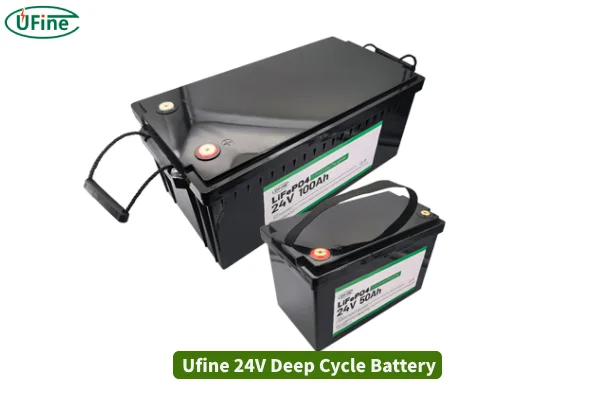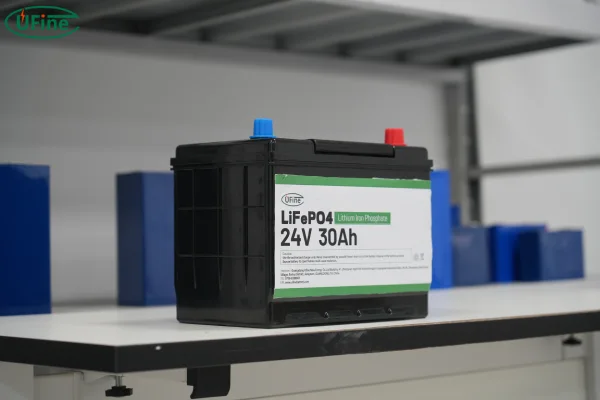When it comes to powering your adventures or essential equipment, choosing the right 24V deep cycle battery is key. These batteries are designed to deliver steady power over a long period, making them perfect for a variety of uses. In this guide, we’ll explore everything you need to know to make an informed decision. So, let’s dive into the world of 24V deep cycle batteries and discover which one is the best for you!
Part 1. What is a 24V deep cycle battery? What Are the Types?
A 24V deep cycle battery is a type of battery specifically designed to provide sustained energy over an extended period. Unlike starter batteries that give a quick burst of energy to start an engine, deep cycle batteries are built to be discharged and recharged many times.
Types of 24V Deep Cycle Batteries
-
Flooded Lead-Acid Batteries: These are the traditional batteries most people are familiar with. They are cost-effective and reliable but require regular maintenance, such as checking water levels and ensuring proper ventilation.
-
AGM (Absorbent Glass Mat) Batteries: These batteries are sealed and maintenance-free. They use a glass mat to absorb the electrolyte, making them spill-proof and less prone to vibration damage. They are a popular choice for those seeking reliability without the hassle of regular upkeep.
-
Gel Batteries: These are similar to AGM batteries but use a gel-like substance to hold the electrolyte. They are highly resistant to temperature extremes and vibrations, making them suitable for harsh environments. However, they can be more expensive than other types.
-
Lithium-Ion Batteries: Known for their lightweight and long lifespan, lithium-ion batteries are becoming increasingly popular. They offer excellent efficiency and can handle more charge cycles than lead-acid batteries. The downside is their higher upfront cost.
Each type of battery has its strengths and weaknesses, so understanding your specific needs will help you choose the right one.
Part 2. Why is it important to choose the right battery?
Choosing the right 24V deep cycle battery is crucial for several reasons. First, it ensures that your devices or equipment operate efficiently and reliably. The wrong battery can lead to frequent replacements, unexpected power losses, and even damage to your equipment. Moreover, the right battery will save you money and time in the long run by reducing maintenance needs and extending the lifespan of your power system. So, taking the time to choose wisely is well worth the effort.
Part 3. Key features of 24V deep cycle battery
When selecting a battery, consider these key features:
-
Capacity: Measured in ampere-hours (Ah), capacity indicates how much energy the battery can store. Higher capacity means the battery can power devices longer before needing a recharge.
-
Cycle Life: This is the number of complete charge and discharge cycles a battery can undergo before its capacity falls below a specific level. A longer cycle life means the battery will last longer.
-
Discharge Rate: This refers to how quickly the battery can deliver power. It’s important to match the discharge rate with your specific power requirements to ensure optimal performance.
-
Weight and Size: Depending on your application, the battery’s weight and size might be crucial factors, especially for portable or space-constrained setups.
-
Durability: Look for batteries that can withstand physical stress, temperature fluctuations, and other environmental conditions. This is particularly important if you plan to use the battery in rugged environments.
Part 4. Which deep cycle battery is the best?
Determining the best 24V deep cycle battery depends on your specific needs and preferences. If you’re looking for longevity and efficiency, lithium-ion batteries are often considered top-tier due to their long lifespan and high efficiency. However, if budget constraints are a concern, AGM or flooded lead-acid batteries might be more suitable. These options provide reliable performance at a more affordable price. Ultimately, evaluating your power needs, budget, and application will guide you to the best choice.
Part 5. Who uses 24V deep cycle battery?

Applications of 24V Deep Cycle Batteries
-
Marine and RVs: These batteries are perfect for powering appliances and electronics on boats and recreational vehicles. They offer the sustained energy needed for long trips without frequent recharging.
-
Solar Energy Systems: In solar setups, 24V deep cycle batteries store energy collected during the day, providing a reliable power source when the sun isn’t shining.
-
Electric Vehicles: Used in electric bikes and small cars, these batteries provide efficient energy storage and long-range capabilities.
-
Backup Power Systems: Essential for ensuring continuous power during outages, these batteries keep critical systems running smoothly.
-
Industrial Equipment: Used in forklifts and other machinery, they offer robust power for demanding industrial applications.
Part 6. Popular brands and manufacturers
Here’s a list of five popular brands known for their quality 24V deep cycle batteries:
-
Ufine Battery: A well-known Chinese manufacturer specializing in lithium battery customization. Ufine offers a wide range of sizes, weights, capacities, and voltages to meet diverse needs.
-
Battle Born Batteries: Known for their durable lithium-ion options, Battle Born is a favorite among RV and marine enthusiasts.
-
Trojan Battery: A leader in deep cycle technology, Trojan Battery is renowned for its reliable and long-lasting products.
-
Renogy: Offers a comprehensive range of solar-compatible batteries, making them a top choice for solar energy systems.
-
Victron Energy: Known for innovative energy solutions, Victron Energy provides high-quality batteries suitable for various applications.
Part 7. How to choose the right 24V deep cycle battery?
Selecting the right battery involves several considerations:
-
Identify Your Needs: Consider the specific application and power requirements. This will help you determine the capacity and features you need.
-
Evaluate Features: Look for capacity, cycle life, discharge rate, and durability. These features will impact the battery’s performance and longevity.
-
Consider Budget: Balance the cost with the features and lifespan. While lithium-ion batteries may be more expensive upfront, their long lifespan can make them more cost-effective in the long run.
-
Check Compatibility: Ensure the battery fits your system’s voltage and space requirements. Compatibility is key to seamless integration and operation.
-
Research Brands: Opt for manufacturers with strong reputations for quality and reliability. Customer reviews and expert recommendations can provide valuable insights.
Part 8. Charging and maintenance
Proper charging and maintenance are essential to maximizing the lifespan and performance of your battery:
-
Use Compatible Chargers: Ensure chargers are designed for your battery type. This prevents damage and enhances efficiency.
-
Avoid Overcharging: Overcharging can damage the battery and reduce its lifespan. Using a smart charger with automatic shutoff can help prevent this.
-
Regular Inspections: Periodically check for physical damage, corrosion, and ensure connections are secure. This helps maintain optimal performance and safety.
Part 9. How long does a 24V deep cycle battery last?
The lifespan of a 24V deep cycle battery varies based on the type and usage:
-
Lithium-Ion Batteries: Typically last over 10 years with proper care. They can handle more charge cycles than other types, making them a long-lasting option.
-
AGM and Gel Batteries: These can last 5-7 years, offering a good balance between performance and cost.
-
Flooded Lead-Acid Batteries: Generally have a lifespan of 3-5 years. Regular maintenance can help extend their life.
Part 10. How to choose a 24V deep cycle battery charger?
Selecting the right charger is crucial for maintaining battery health:
-
Matching Voltage: Ensure the charger’s voltage aligns with the battery. This compatibility is essential for safe and efficient charging.
-
Smart Features: Look for chargers with features like automatic shutoff, temperature regulation, and multi-stage charging. These enhance safety and maximize efficiency.
-
Brand Compatibility: Using a charger from the same manufacturer can enhance performance and ensure optimal charging conditions.
In conclusion, finding the best 24V deep cycle battery involves understanding your specific needs, evaluating key features, and considering applications and brands. With the right choice, you can enjoy reliable and efficient power for years to come. Whether you’re powering an RV, marine equipment, or a solar energy system, the right battery can make all the difference.
Related Tags:
More Articles

How to Choose the Best Floor Scrubber Battery for Commercial Cleaning?
Selecting the ideal floor scrubber battery ensures a long runtime, rapid charging, and minimal maintenance for efficient commercial cleaning operations.
Battery for Blower vs Battery for Leaf Vacuum: Which One Should You Choose?
Battery for blower vs leaf vacuum—learn the key differences in power, fit, and runtime to choose the right battery for your outdoor tool needs.
How to Choose the Right Battery for Blower?
Choosing the right blower battery? Consider voltage, capacity, chemistry & usage. This guide helps match the best battery for peak performance.
How to Choose the Best Insulated Battery Box for Lithium Batteries?
Choosing the Best Insulated Battery Box for Lithium Batteries? Discover key factors such as size, material, and safety for optimal protection and performance.
7 Critical Elements on a Lithium Battery Shipping Label
What must be on a lithium battery shipping label? Learn 7 key elements to ensure safety, legal compliance, and correct handling across all transport modes.





